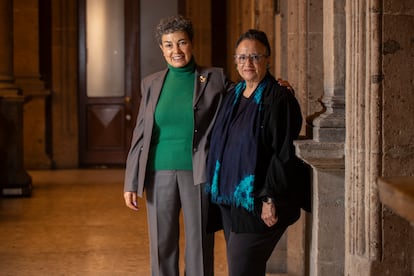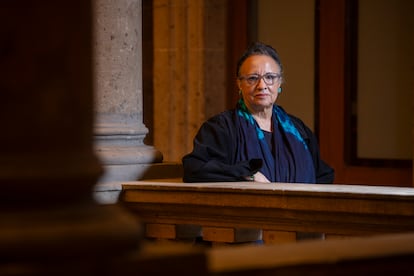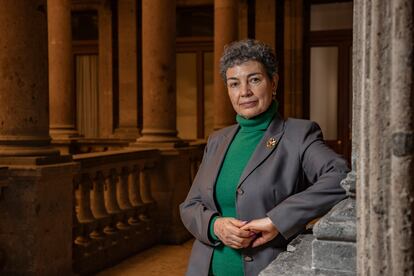Elderly Mexican migrants: ‘When we grow old, neither Mexico nor the United States wants us’
The National Day Laborer Organizing Network, which includes over 70 organizations, is urging Claudia Sheinbaum’s government to provide the pension to those over 65 living in the US


Mexican migrants in the United States are aging, and many of them do not have adequate pensions or sufficient savings to support themselves. After decades of hard work, many over the age of 65 reach retirement without being able to stop work. While some receive pensions, the majority do not. Others receive amounts too small to cover basic expenses, such as rent or health insurance. It is estimated that around two million elderly Mexican migrants live in the United States. Of these, some 500,000 are undocumented.
This week, a group representing about 70 civil organizations visited Mexico’s National Palace with a specific request for Claudia Sheinbaum’s government: to allow Mexican migrants to access the Pension Bienestar — the country’s pension program — even if they don’t live in Mexico.
The group is part of the National Day Laborer Organizing Network (NDLON). Two prominent members, María Marroquín and Ángela Sanbrano, spoke at the morning press conference. Both women have spent most of their lives working in the United States and know firsthand what it is like to work in precarious hourly jobs. For years, they have sent remittances back home, supporting both the U.S. and Mexican economies with their labor.
“These people spend decades working in the fields, gardening, construction, and when they get older there is no work because they no longer have the strength. Also because they are tired from working all their lives,” explains Marroquín, 66, originally from Puebla and now living in California. She coordinates the Day Worker Center, a nonprofit organization in Mountain View.
The group is advocating for Mexican migrants over 65 to receive $300 every two months (approximately 6,000 pesos) from the Mexican government. Without the ability to work or access a pension, these older adults often find themselves marginalized by a system that has abandoned them to their fate. “When we grow old, neither Mexico nor the United States wants us,” says Marroquín, who points out that many of the ailments faced by this population stem from the grueling labor they have performed for decades. “Both countries are failing this population that has been caught in the middle,” she added.
Despite their years of contribution, these individuals are left without support. Employers won’t hire them, and neither government provides a path to retirement or pensions. “The U.S. government doesn’t grant pensions to these people because they didn’t pay into the system,” says Marroquín, “but they did contribute by paying taxes. They have identification numbers tied to the payments they made throughout their lives.”
“It is unfair because the United States would not be the country it is today if it were not for Latinos. We are a very important part of the country’s economy,” adds Ángela Sanbrano.

The network of migrant organizations was hopeful about the creation of the Pensión Bienestar during the administration of former Mexican president Andrés Manuel López Obrador. This program allows all adults over 65, regardless of whether they have paid contributions, to receive a payment of 6,000 pesos (approximately $300) every two months. However, the current requirements mandate residency in Mexico, effectively excluding migrants living abroad from accessing the benefit.
A recent constitutional reform, however, enshrined social programs, including the pension for older adults, as inalienable rights in the Magna Carta. “I didn’t cross the border; the border crossed me,” says Ángela Sanbrano, 79, originally from Ciudad Juárez and a Los Angeles resident for over 60 years. “A Mexican takes their rights wherever they go, right? The pension is a right we have as Mexicans, so we ask our government not to forget us.”
Before leaving office, former López Obrador announced that Mexican workers in the United States would qualify for the national social security program. However, the measure has yet to be implemented. Three months into the new administration, President Claudia Sheinbaum’s government inherits this mandate. Sheinbaum has said Mexican workers abroad are “heroes and heroines” and that she values the hard work they do. However, she explained that her government must assess the national budget before delivering a definitive response to the request.
Implementing the pension for undocumented Mexicans abroad would require at least an estimated 21 billion pesos (approximately $1 billion). “We believe our cause has gained significant traction after the president’s response,” the National Day Laborer Organizing Network stated. They noted that Sheinbaum “understood the human significance” of their plea and appreciated her sincerity. “We trust that the authorities’ budget analysis will take into account the urgent needs of Mexicans in the United States,” they added in a statement.

Ninety-six percent of remittances sent to Mexico come from the United States. Mexican migrants send money to their families, and these remittances have become one of the most important sources of income, particularly for the most vulnerable families. Since records began, remittances have consistently grown year after year, emerging as a vital source of financing for the Mexican economy. Last year, they surpassed 63 billion pesos (around $3 billion), and this figure is expected to be exceeded again this year.
The impending arrival of Donald Trump to the White House has intensified concerns about the immigration status of thousands of people, including those over 65 who may face deportation. The incoming administration has threatened to carry out mass deportations of approximately 11 million people. “Difficult times are ahead for migrants with Donald Trump, but we are prepared to fight. We are Mexicans, we have overcome many crises, and we are still here,” says Sanbrano optimistically.
After many years, both women now hold dual nationality, although they assert that Mexico will always be their homeland. “Let’s say my roots are Mexican, and in the United States, I grew branches and some very beautiful fruits,” Marroquín says, referring to her son and grandchildren. “Mexicans are a nation with one foot in each country, and that makes us who we are, whether we like it or not,” adds Sanbrano.
Sign up for our weekly newsletter to get more English-language news coverage from EL PAÍS USA Edition
Tu suscripción se está usando en otro dispositivo
¿Quieres añadir otro usuario a tu suscripción?
Si continúas leyendo en este dispositivo, no se podrá leer en el otro.
FlechaTu suscripción se está usando en otro dispositivo y solo puedes acceder a EL PAÍS desde un dispositivo a la vez.
Si quieres compartir tu cuenta, cambia tu suscripción a la modalidad Premium, así podrás añadir otro usuario. Cada uno accederá con su propia cuenta de email, lo que os permitirá personalizar vuestra experiencia en EL PAÍS.
¿Tienes una suscripción de empresa? Accede aquí para contratar más cuentas.
En el caso de no saber quién está usando tu cuenta, te recomendamos cambiar tu contraseña aquí.
Si decides continuar compartiendo tu cuenta, este mensaje se mostrará en tu dispositivo y en el de la otra persona que está usando tu cuenta de forma indefinida, afectando a tu experiencia de lectura. Puedes consultar aquí los términos y condiciones de la suscripción digital.








































